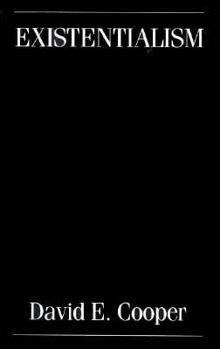Existentialism: A Reconstruction
Select Format
Select Condition 
Book Overview
First published in 1990, Existentialism is widely regarded as a classic introductory survey of the topic. It has helped to renew interest in existentialist philosophy. Cooper places existentialism within the great traditions of philosophy, & argues that it deserves as much attention from analytic philosophers as it has always received on the continent. Discussions of the self & others, & of "Angst" & absurdity lead into chapters on existential freedom & the prospects for an existentialist ethics. Writers discussed include Husserl, Jaspers, Buber, Marcel, & Ortega. David E. Cooper provides a sympathetic, original account of a mainstream movement of philosophical thought, reconstructed from the best writing of Heidegger, Sartre, Merleau-Ponty & others.
Format:Paperback
Language:English
ISBN:0631161929
ISBN13:9780631161929
Release Date:January 1990
Publisher:Blackwell Publishers
Length:201 Pages
Weight:0.75 lbs.
Dimensions:0.6" x 6.0" x 9.0"
Customer Reviews
4 ratings
...Not for blokes....
Published by Thriftbooks.com User , 23 years ago
David E. Cooper shows how many of the popular views on existentialism are actually misconceptions about the philosophy - this book is very helpful in dispelling the dictionary definition of existentialism. The idea that Existentialism is irrational or an anti-rational form of philosophy is shown to be an incorrect interpretation of what existential thought is about. Cooper shows that the existentialists where not against reason or rational thought but where really against a narrow form of rationalism -also empiricism- which attempted, through non-involvement in the human world, to gain a god-like perspective; a detached and impersonal view from nowhere within the world. Against this the existentialists wanted to show that we are all participants in human affairs and not mere spectators. Other misconceptions mentioned in the book were; that existentialism is just a phenomena born out of post-war Europe; that existentialism is a form of subjectivist philosophy; and that there was a large gulf between Sartre and Heidegger, Sartre -it is often claimed- was a Cartesian while Heidegger was Anti-Cartesian etc.. Some other misconceptions are also mentioned. I thought the book was missing many of the insights from literature into existentialist thought -although some people will think that is a positive thing. Dostoevsky was not mentioned; I don't remember Kafkas great existential novels (the Trial or the Castle) coming up; and Camus is only mentioned long enough for us to see that he was neither philosophical or systematic and therefore not included. Cooper is not as hostile towards Camus as Sartre was in his review of the Rebel in Les Temps Modenes, but if you are a Camus fan you might want to look away. Of course every book has to make some cuts and Cooper does give reasons for his omissions. I found the book very helpful and enjoyable, it would probably make a good introduction, but I wouldn't base all my opinions of the philosophy on it.
Existentialism clarified and made practical
Published by Thriftbooks.com User , 24 years ago
I enjoyed the well-written book (and I came as a sceptic). Cooper not only synthesizes the different strands of existentialism, but nicely fills in weaknesses before showing how the existentialistic argument can deliver a reasonable philosophy to live by. To help you judge where I am coming from, consider two other books of practical philosophy that I liked: Peter Singer's "Essential Singer: Writings on an ethical life" and Stephen Batchelor's "Buddhism Without Beliefs".
The best of general introductions to Existentialism.
Published by Thriftbooks.com User , 26 years ago
This is the best of all exisiting introductions to Existentialism in English, and perhaps any language. The clarity is not bogus. It is exemplary in the number of confusions it clears up. Existentialism is far from a passing post-war fad, and Cooper shows why, chapter after chapter. This is a book that should be on every philosophy student's reading list.
A coherent and detailed description of existentialism
Published by Thriftbooks.com User , 26 years ago
This is a detailed and interesting analysis of the underrated philosophy, existentialism. Dr. Cooper builds a coherent and useful philosophy from the writings of several diverse, and thoroughly vague, philosophers (focusing on the works of Kierkegaard, Heidegger, Nietzsche, and Sartre). Dr. Cooper does much to dissolve the common conception of existentialism as merely a cultural movement. Although somewhat awkwardly worded in places, it is a wonderful book that will most certainly not leave the reader unchanged (if nothing else it will change the readers opinion of the importance of existentialism in the overall history of philosophy).






